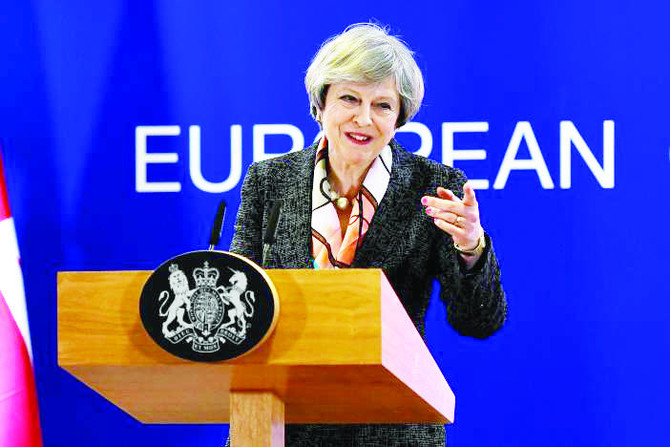BRUSSELS: It was her last EU Summit before launching Brexit, but British Prime Minister Theresa May was keener to talk about pretty much anything else.
May, who will trigger Article 50 of the EU’s Lisbon Treaty to launch two years of divorce talks later this month, was keen not to linger on her plans for some of the most complicated negotiations Britain has faced since World War II.
At a meeting held in the shadow of Brexit but dominated by more immediate concerns like re-electing the EU Summit chairman, May set out to show her fellow leaders that Britain was still a reliable member, despite choosing “a different path.”
She offered suggestions on everything from countering Russian “disinformation” to tackling organized crime — topics that helped her to underline Britain’s contribution in areas like security and intelligence.
Underlying her arguments was an implicit reminder to her partners in the upcoming negotiations that the UK has strengths that they need.
“At this summit we’ve shown once again how Britain will continue to play a leading role in Europe long after we have left the EU,” she told reporters, announcing for example that she would boost security cooperation and host a summit for the western Balkans.
But on the EU’s most pressing question — the timing of triggering Article 50 — she gave little away, only reiterating that she would launch the talks by the end of this month.
Wish them well
May enters the negotiations with a long wish list — wanting the closest possible trading ties, security cooperation, regaining control over immigration and restoring sovereignty over British laws.
The EU has balked at her demands, saying they amount to “having your cake and eating it,” and May’s government acknowledges it is a bold opening position.
But she promised to remain “a good friend and ally” to the EU, reminding the leaders of the benefits of cooperation with Britain to try to persuade them to maintain “frictionless trade” and strong economic ties.
Apart from justice cooperation, Britain has talked up its deployment of troops on the EU’s eastern fringe to stem an emboldened Russia. May’s team has also signaled areas for possible compromise, including fisheries policy.
She has not ruled out paying into EU coffers to participate in “some specific European programs.”
But the fact that May left the summit after a dinner late on Thursday was a reminder that Britain is already, more often than not, out of the room.
The other 27 leaders use Friday to prepare for a “unity” summit to be held in Rome on March 25, the 60th anniversary of the treaty that laid the EU’s foundation.
“We’ve chosen a different path and we wish them well,” a British government source said on Wednesday when asked whether May will be invited.


Silence is golden — May plays down Brexit talk at EU Summit
Silence is golden — May plays down Brexit talk at EU Summit

Ex-UK ambassador apologizes to Epstein victims

LONDON: Former British ambassador to Washington Peter Mandelson has offered an “unequivocal” apology to the victims of Jeffrey Epstein for his friendship with the late US sex offender.
Mandelson had faced criticism after failing to apologize in his first broadcast interview, which aired on Sunday, since he was fired as Britain’s top diplomat in Washington last September over the issue.
“I was wrong to believe him following his conviction and to continue my association with him afterwards,” Mandelson said in a statement released to the BBC’s Newsnight program late on Monday following the backlash.
“I apologize unequivocally for doing so to the women and girls who suffered.”
Prime Minister Keir Starmer sacked the ex-spin doctor and former government minister four months ago after emails emerged showing he had maintained contact with Epstein even after the American was convicted of child sex offenses in 2008.
In the interview aired on Sunday, Mandelson had said it was “misplaced loyalty” and “a most terrible mistake on my part.”
He also suggested Epstein excluded him from the “sexual side” of his life because he was gay.
Dubbed the “Prince of Darkness” during his years as a media adviser, Mandelson was twice forced to resign from Tony Blair’s Labour government in the late 1990s and early 2000s over allegations of misconduct.
Mandelson had faced criticism after failing to apologize in his first broadcast interview, which aired on Sunday, since he was fired as Britain’s top diplomat in Washington last September over the issue.
“I was wrong to believe him following his conviction and to continue my association with him afterwards,” Mandelson said in a statement released to the BBC’s Newsnight program late on Monday following the backlash.
“I apologize unequivocally for doing so to the women and girls who suffered.”
Prime Minister Keir Starmer sacked the ex-spin doctor and former government minister four months ago after emails emerged showing he had maintained contact with Epstein even after the American was convicted of child sex offenses in 2008.
In the interview aired on Sunday, Mandelson had said it was “misplaced loyalty” and “a most terrible mistake on my part.”
He also suggested Epstein excluded him from the “sexual side” of his life because he was gay.
Dubbed the “Prince of Darkness” during his years as a media adviser, Mandelson was twice forced to resign from Tony Blair’s Labour government in the late 1990s and early 2000s over allegations of misconduct.
© 2026 SAUDI RESEARCH & PUBLISHING COMPANY, All Rights Reserved And subject to Terms of Use Agreement.









